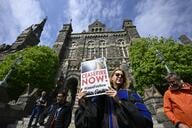You have /5 articles left.
Sign up for a free account or log in.
DUBAI -- At international education meetings, representatives of various countries like to boast about how they have become higher ed hubs, or have built education cities, or have created education zones. Just as American states vow to create the next Silicon Valley or Research Triangle Park, and to become known as a place with top universities and the businesses they spawned, countries all over the world want buzz as the hot hub or the next hub.
But even as attendees at this week's Going Global (the British Council's main international education meeting) heard boasts from various hubs, a session here attempted to make some sense of all of the hubs, and to help educators understand which ones are real, and how hubs differ from one another.
Jane Knight, a scholar at the University of Toronto's Ontario Institute for Studies in Education, presented the results of extensive research she has done on six hubs. To the question, "Are they a serious innovation or just a branding label?" Knight said that they are serious. But she said that people need to stop seeing hubs as all trying to achieve, or likely to achieve, the same things.
Further, she argued that hubs -- while she placed them all in countries -- aren't just about places on a single campus. "It's not one physical space, but connections," she said. And she said hubs don't "just happen," but are the result of planning and execution.
Knight proposed a schema for classifying hubs. While all may aim to attract foreign students and foreign branch campuses, they strive to be three main things, she said:
- Student hubs, which seek to attract local and foreign students.
- Talent hubs, which seek to develop the skilled people who will stay in the country.
- Knowledge hubs, which seek to build research infrastructure.
Here is how Knight classifies the six hubs she studied, both with their current category and what she thinks the country aspires to see its hub become.
| Country | Year Hub Started | Number of International Branch Campuses | Current Classification | 'Aspirational' Classification |
| Qatar | 1995 | 10 | Talent | Knowledge |
| Singapore | 1998 | 18 | Knowledge | Unclear |
| United Arab Emirates | 2003 | 37 | Talent | Talent and knowledge |
| Malaysia | 2007 | 7 | Student | Knowledge |
| Botswana | 2008 | 2 | Student | Talent |
| Hong Kong | 2008 | 4 | Student | Talent |
Knight said that the goals for the hub influence who the players are -- and that educators may not be the key players when a country is focused, for example, on becoming a knowledge hub. Rather, businesses or government officials who deal with immigration policy may become key players. She also said that thinking about goals also shifts away from simply counting the number of branch campuses -- a figure that may be less important in some hubs.
"Policy makers have different agendas," she said.
While education hubs will continue to evolve, they represent an important "third stage" in transnational education, she said. The first was student mobility, with students leaving their homes for a postsecondary education. The second was institutional mobility, when colleges set up dual degrees or branch campuses in other countries. Hubs involve the first two stages, but take them to a new level, she said.
Knight's analysis was generally well received, but there were some elaborations from other speakers and from the audience on qualities that might make some hubs more successful than others.
Eden Y. Woon, vice president for institutional advancement at the Hong Kong University of Science and Technology, said he favored looking at some other qualities of hubs, at least based on the Hong Kong experience. It's not enough, he said, to invite in some branch campuses and set them up with nice facilities. A true hub has to be both "an international place" and a free place. "You need the free flow of people, of information, of money, of ideas, of goods," he said.
Further, he said that while branch campuses can be a key element for hubs, a truly sustainable hub would have (or be building) strong local institutions. Hong Kong, he said, has three research universities of international stature -- his own institution, the University of Hong Kong, and Chinese University of Hong Kong. Strong local universities, he said, "give a lot of credence" to the idea that a country or region is making true, long-term commitments to higher education.
Goolam Mohamedbhai, former vice chancellor of the University of Mauritius and former secretary general of the Association of African Universities, went further. He said that the investment in higher education hubs built on branch campuses can be dangerous to local institutions. Money goes to the foreign universities, and the presence of branch campuses can be used to justify failure to invest in local higher education, he said.
"Any country that doesn’t have a very strong higher education sector, for it to try to go into international hub business with branches, local institutions could be sidelined and weakened," Mohamedbhai said.
Woon responded by saying that he did not believe it was an "either/or" decision with regard to supporting branches and local universities. He noted that the world regularly marvels at the way China is building up its universities. "But they are also working very hard to attract branch campuses," he said.




